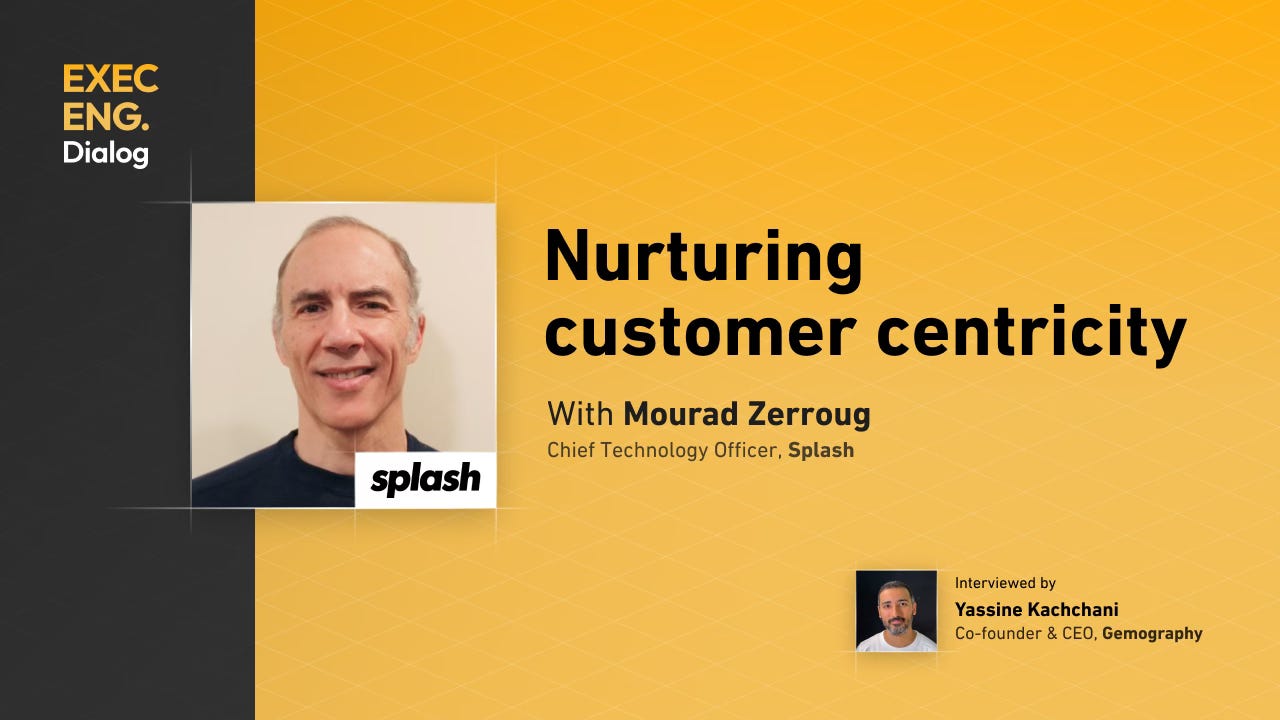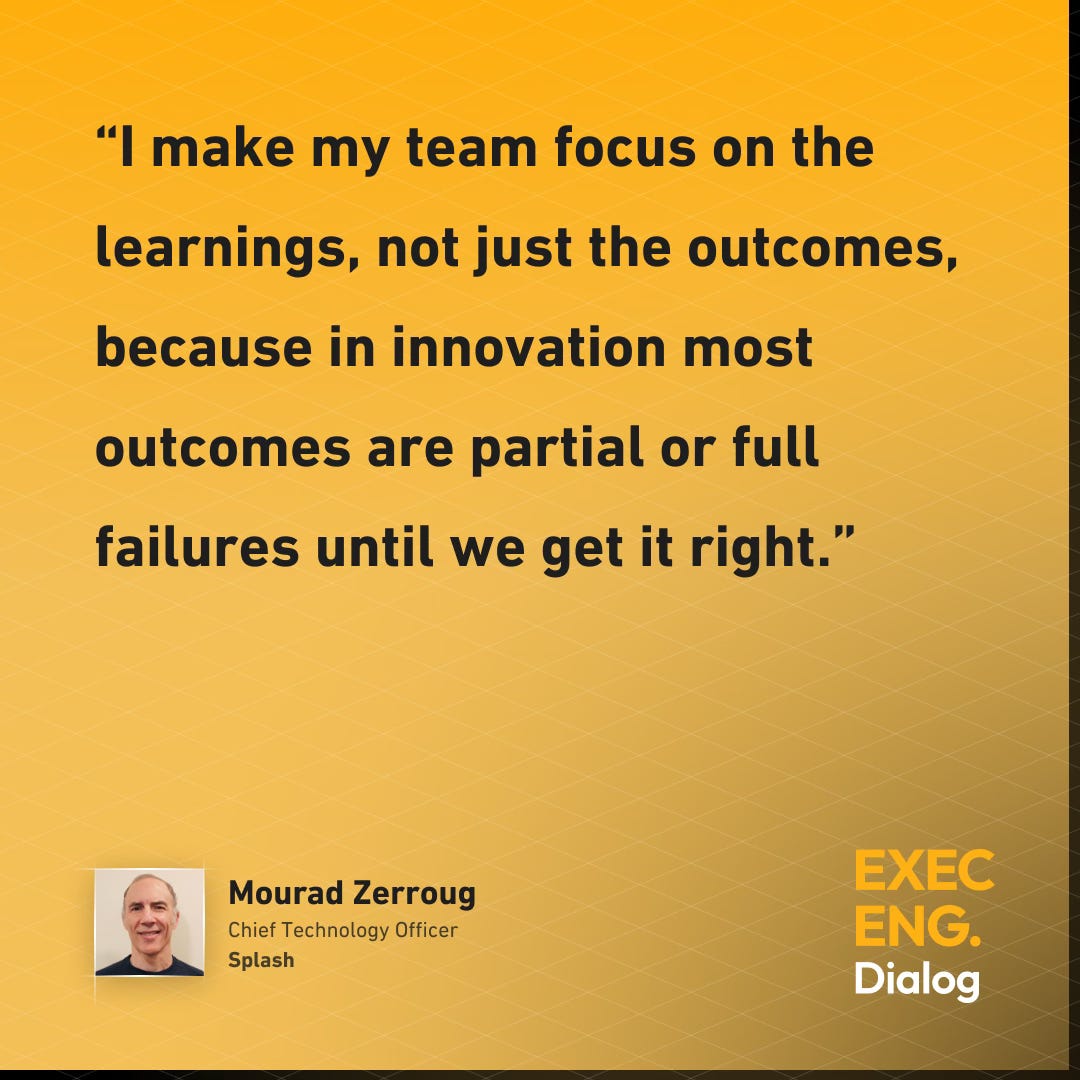Non-negotiables in building teams, customer obsession, embracing failure | Mourad Zerroug, CTO, Splash
Today's guest is Mourad Zerroug, Chief Technology Officer of Splash, a leading event marketing platform recently acquired by Cvent.
With over 20 years of experience in the software industry, Mourad has held leadership positions and built high-performing teams in companies ranging from startups to larger enterprises.
What sets him apart is his unwavering focus on customer satisfaction coupled with his ability to build and inspire high-performing teams.
Highlights
Building a tech team in a startup vs. larger companies.
Mourad’s non-negotiables for building high-performance teams.
Promoting customer obsession in engineering teams.
Embracing failure in innovation.
The role of CTOs and keeping up with advances in tech.
Yassine: You've worked in both startups and larger companies. How does your approach to building tech teams differ in these contrasting environments?
Mourad: Lots of similarities and differences. It starts with culture, which also encompasses values. The values to instill in an Engineering team need to instantiate company values.
A startup often means a smaller team or a team in a small environment, where everyone is more visible, not just team-wide but also company-wide. Furthermore, a startup has likely not yet reached product-market fit or at least not business scale and growth. As a result, I would focus on instilling a greater sense of opportunity and embracing the need to wear many hats and to “show up” more than in larger companies, given the likely lesser compensation and long hours.
Also, for startup teams, it’s about nurturing rapid development grounded on experimentation and “fail fast” principles, and where every team member can contribute ideas.
I would also nurture a stronger sense of the customer and their needs and encourage working closely with peers from Product, Support, Marketing, and other functional areas. This relationship needs to be at the personal level with camaraderie and passion for the vision.
After all, product-market fit is only reached when we place the customer at the center and iterate fast, acknowledging that our hypotheses may or may not pan out. The main operational mode is high-velocity development with a purpose.
In a larger company, there are still aspects of the above, including culture and values, performance and delivery, etc. However, as the company already has a well-defined market presence and one or more products, the focus is more on roadmaps and operations efficiency at scale.
Thus, I would groom the team into a strong execution mode with all that entails. But this doesn’t mean that the team doesn’t adopt rapid development or innovation—it still needs a growth mindset and, from a leadership standpoint, it’s important to keep some level of innovation and experimentation in larger teams while maintaining a structure that facilitates this mode, such as multiple scrum teams focused on value streams.
So, success for larger teams is measured in different ways, mostly in the delivery of roadmap plans, OKRs, and other metrics.
In addition, and given the larger company context, I would work with the team to establish a career growth plan and foster interest in career growth and working toward that.
Y: What are some non-negotiable qualities you look for when building a high-performing tech team?
Mourad: Team spirit, because success is a team sport, not an individual one. A bright engineer who is not a team player causes friction and a negative cultural impact. A growing engineer who exhibits great collaboration and team spirit is more valuable to the team.
Engagement, defined by a sense of initiative and openness to other ideas/opinions. The self-centered engineer or the one who limits their work to just the needed is not benefiting the team or themselves. A driver mindset is key to collective success.
Ownership and self-accountability are also non-negotiable. An engineer who drops tasks consistently or who has to be reminded too frequently creates high overhead and has no passion or capacity to play an active role.
The ability and willingness to learn continuously and go beyond their current knowledge are a must as well. No one knows it all, and an engineer who thinks they do and would not go beyond will end up slowing down the team or, at best, capping their ability to innovate. Frameworks and best practices continuously evolve, and learning and curiosity are essential and tend to be contagious. We want this in an engineering team.
Finally, cultural fit and affinity (not necessarily similarity) defined as someone who adds positives to the culture, such as enthusiasm, mutual support, and empathy. An engineer who is negative, does not contribute to small win celebrations, or, worse yet, likes blame games cannot stay in the team.
Y: How important is cultural fit versus technical skills when hiring for your tech teams, and how do you assess for both?
Mourad: It’s more critical to have “cultural affinity” than to have outstanding skills. The latter can be learned through practice and training, coaching, etc.
I focus on “cultural affinity,” not just “fit”—I like fresh cultural additions, as opposed to “more of the same,” to the existing culture, when they can enhance the culture in more positive ways. This helps with adding fresh perspectives and avoiding groupthink and confirmation bias.
Y: You describe yourself as someone with a “customer obsession.” How do you nurture this value in your engineering teams, especially when they might be several steps removed from direct customer interaction?
Mourad: It starts with instilling an understanding of our mission in the engineers.
It’s not about writing great code but about solving problems for people, and we happen to do this by writing the best code we can and iterating on making it better while stressing that the goal is not the code, it’s the solutions.
Then, it goes into understanding the characteristics of the various customers, such as their personas, how they think, and the needs they have.
I've invited both internal teams (Customer Success and Marketing) and, in some cases, customers themselves to share insights with my engineers about how our solutions are used and perceived. In different places where I worked, I have sent my team members to our customers’ sites to observe and learn how customers work. Another thing I did was send my team to witness and even help with customer support.
Y: You've written about embracing failure as a path to innovation. How do you create a safe environment for your tech talent to take risks and learn from mistakes?
Mourad: At the core is leading by example. I try to project and foster a passion for innovation with a focus on solution discovery and prototyping. I make my team focus on the learnings, not just the outcomes, because in innovation, most outcomes are partial or full failures until we get it right.
The cultural aspect of not demonizing failures due to good intentions, celebrating and recognizing experiments and learnings is important.
Y: Looking ahead, how do you see the role of CTOs evolving in the next 5-10 years, especially with the rapid advancements in AI and other emerging technologies?
Mourad: CTOs, by definition, need to stay curious and up-to-date with technology advancements. The field of AI and many others are evolving much faster than before, thanks to compound technology maturation and the occasional inflection points such as recent AI breakthroughs.
A CTO should be able to map those technological opportunities with business opportunities, including customer solution opportunities (i.e., new ways to solve problems for customers).
This means CTOs need to work even more closely with peers from other functional areas and must position themselves and their Engineering team not as mere "service providers" (i.e., code development shop) but as strategic allies in identifying opportunities grounded on technology and crafting strategies company-wide.
Thank you Mourad for your time and insights!
This interview is part of the “Exec Engineering Dialog” series, where I interview seasoned tech leaders on the topics of talent, product, management, and culture.
If you liked the insights shared in this interview, consider giving feedback and/or sharing it with your network, it’s the best way to help this segment improve and grow.
Yassine.




